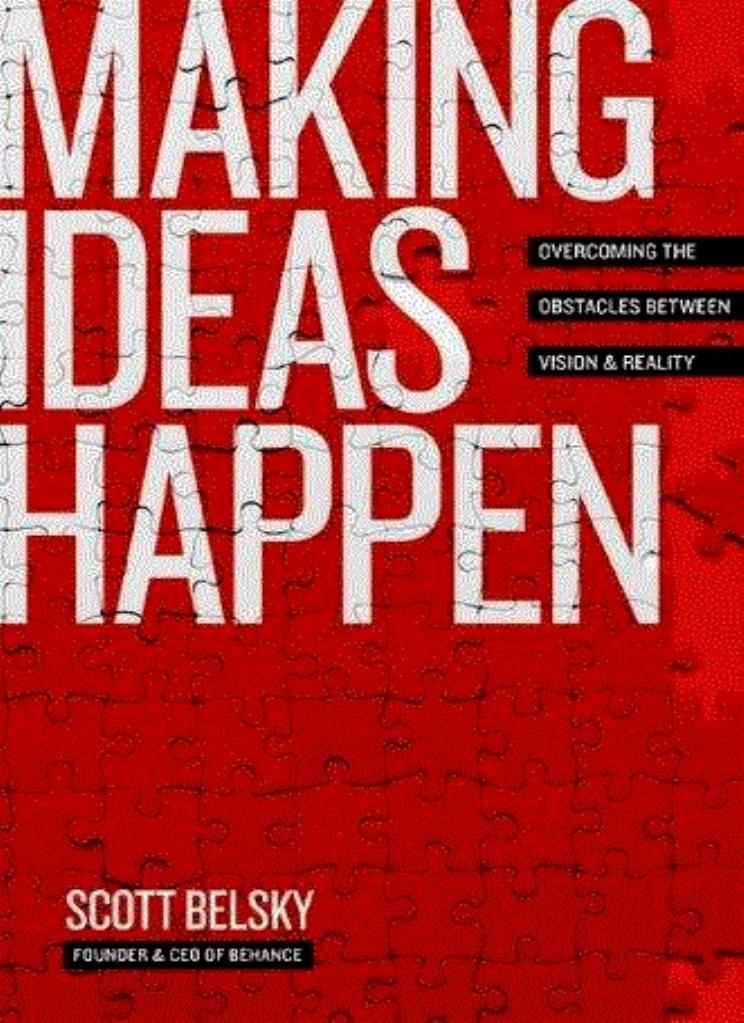Making Ideas Happen: Overcoming the Obstacles Between Vision and Reality by Scott Belsky

Author:Scott Belsky [Belsky, Scott]
Language: eng
Format: epub, pdf
Published: 0101-01-01T00:00:00+00:00
Capitalize on Feedback
As you share your ideas with others, you wil start to see whether people engage (or not) with your ideas once they’re out there. The level of engagement alone can shed new light on the value and potential flaws of your ideas. And as people engage with your ideas, they wil develop opinions about them. Ideal y, the opinions wil result in an exchange, and this exchange wil result in useful feedback.
The value of feedback is inarguable. It is a powerful, sobering force that can help refine good ideas, kil bad ones, and postpone premature ideas that are not yet ripe. But if feedback is so readily available around us—and so crucial in making ideas happen —why is there so little focus on it? Very few creative teams that we’ve met— in start-ups as wel as in established companies—place significant emphasis on promoting feedback exchange. And a lot of creative minds can barely tolerate feedback.
Feedback in the creative world is clouded by a unique conundrum that ultimately comes down to incentives. While the value of feedback is high, the incentive to give feedback to others is low—and the actual desire to hear it is often nonexistent. After al , the work you do to pursue your ideas is a labor of love. The last thing anyone wants is to hear harsh truths about a loved one.
However, the more enamored we are with an idea, the more we need this reality check. Despite the uncomfortable friction that feedback may cause, we benefit when we are able to tolerate it. Those who are best able to seek and incorporate feedback see it as an asset and, in some ways, a form of nonfinancial compensation. At the end of a project, they wil request feedback from others. Simple questions like “How did that go?”
or “Is there anything I said that didn’t make sense—or that you would have done differently?” can prompt an exchange yielding valuable insights. It can soften the terrain for feedback exchange in the future as wel .
As a freelancer or a manager of a large team, you can develop methods for consistently gathering and exchanging feedback. One best practice for smal high-performing teams was taught to me by Steffen Landauer, vice president of leadership development at Hewlett-Packard. Steffen encourages leaders to send an e-mail to each person on their team—as wel as to key clients—requesting a few feedback points for each participant under the headings START, STOP, and CONTINUE.
Each recipient is asked to share a few things that each of their col eagues and clients should START, STOP, and CONTINUE doing. People then return their lists to the team’s leader (except for the feedback about the leader, which is redirected to someone else on the team). The points under each heading are aggregated to identify the larger trends: what are most people suggesting that Scott START doing, STOP doing, and CONTINUE doing? Isolated points mentioned by only one person are discarded and the common themes are then shared in a personal meeting with each member of the team.
Download
Making Ideas Happen: Overcoming the Obstacles Between Vision and Reality by Scott Belsky.pdf
This site does not store any files on its server. We only index and link to content provided by other sites. Please contact the content providers to delete copyright contents if any and email us, we'll remove relevant links or contents immediately.
Hit Refresh by Satya Nadella(9123)
The Compound Effect by Darren Hardy(8941)
Change Your Questions, Change Your Life by Marilee Adams(7758)
Nudge - Improving Decisions about Health, Wealth, and Happiness by Thaler Sunstein(7690)
The Black Swan by Nassim Nicholas Taleb(7106)
Deep Work by Cal Newport(7063)
Rich Dad Poor Dad by Robert T. Kiyosaki(6605)
Daring Greatly by Brene Brown(6501)
Principles: Life and Work by Ray Dalio(6417)
Playing to Win_ How Strategy Really Works by A.G. Lafley & Roger L. Martin(6229)
Man-made Catastrophes and Risk Information Concealment by Dmitry Chernov & Didier Sornette(6003)
Big Magic: Creative Living Beyond Fear by Elizabeth Gilbert(5754)
Digital Minimalism by Cal Newport;(5748)
The Myth of the Strong Leader by Archie Brown(5496)
The Slight Edge by Jeff Olson(5410)
Discipline Equals Freedom by Jocko Willink(5378)
The Motivation Myth by Jeff Haden(5203)
The Laws of Human Nature by Robert Greene(5171)
Stone's Rules by Roger Stone(5080)
